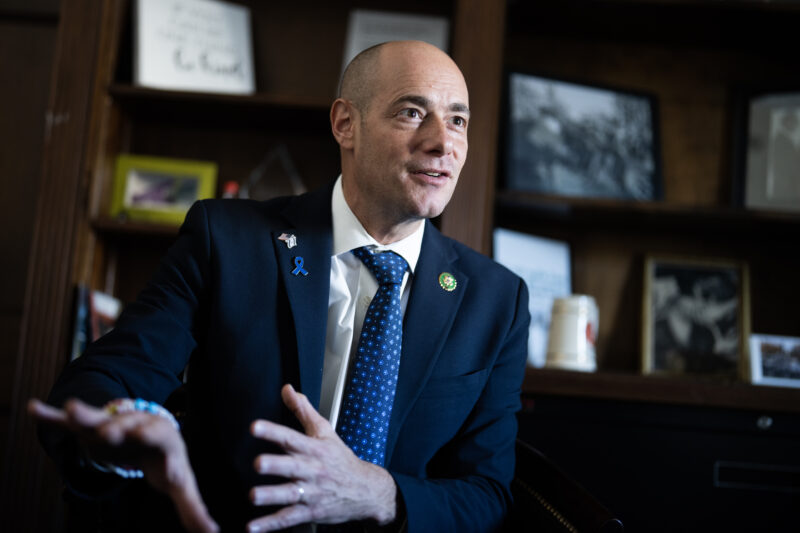Plus, CNN terms 'Palestinian-Israeli towns'

Tom Williams/CQ-Roll Call, Inc via Getty Images
CIA Director John Ratcliffe arrives to the U.S. Capitol for a Senate Appropriations Subcommittee on Defense closed hearing titled "A Review of the President's FY2026 Budget Request for the Intelligence Community," on Tuesday, June 17, 2025.
Good Friday morning.
In today’s Daily Kickoff, we report on Iran’s second ballistic missile strike on Beersheba in as many days, and cover CIA Director John Ratcliffe’s suggestion that Iran is like a football team nearing the 1-yard line in its quest for a nuclear weapon. We report on a Democratic primary between a DSA candidate and a more moderate challenger in South Brooklyn, and talk to Rep. Randy Fine, the newest Jewish member of Congress. Also in today’s Daily Kickoff: Rep. Max Miller, Josh Kesselman and Edan Alexander.
For less-distracted reading over the weekend, browse this week’s edition of The Weekly Print, a curated print-friendly PDF featuring a selection of recent Jewish Insider and eJewishPhilanthropy stories, including: Persian Jews in the U.S. watch Israeli strikes on Iran and dare to hope; How a Mediterranean vacation destination for Israelis turned into a displaced persons hub; and Leonard Lauder, who supercharged his family’s cosmetics firm and became an arts patron, dies at 92. Print the latest edition here.
What We’re Watching
- President Donald Trump is convening the National Security Council at 11 a.m. as senior U.S. officials mull American involvement in what has been to date a conflict between Israel and Iran.
- Iranian Foreign Minister Abbas Araghchi is meeting for nuclear talks today in Geneva with his counterparts from France, Germany and the U.K. The European delegation is also set to meet with the EU’s top diplomat, Kaja Kallas.
- The Washington Institute for Near East Policy’s Anna Borshchevskaya, Michael Knights, Farzin Nadimi and Assaf Orion are headlining a virtual event this afternoon focused on the Israel-Iran war.
- The Jewish Democratic Council of America is hosting a briefing on the Israel-Iran war with Reps. Ritchie Torres (D-NY), Adam Smith (D-WA) and Debbie Wasserman Schultz (D-FL).
- Israeli Ambassador Yechiel Leiter is appearing on CBS’ “Face the Nation” on Sunday.
What You Should Know
A QUICK WORD WITH JI’S melissa weiss
On Thursday, NBC News reported a claim from Iran’s Ministry of Health that “over 2,500 injured people were treated in public and university hospitals, with 1,600 discharged and about 500 still hospitalized.” Earlier this week, CBS News reported 224 Iranians were dead from Israeli airstrikes, also attributed to Iran’s Ministry of Health.
There is no free press in Iran, and journalists have been arrested and imprisoned simply for practicing journalism in the Islamic Republic. There is no real way to verify the Iranian Health Ministry’s numbers, and so many journalists report them, unscrupulously.
In a fast-paced, constantly evolving news environment, accuracy is paramount. The ability to try to authenticate a statistic by attributing it to an official government source, while knowing that the source is unreliable, can serve as the basis for an inaccurate narrative with wide-ranging effects.
An ABC News report from earlier this week on violence near humanitarian aid distribution sites in Gaza leads with the headline “More than 30 killed at controversial foundation’s aid distribution sites in Gaza: Health officials,” giving an air of legitimacy to the claim — even though a reader would have to move down to the story before learning that those health officials came from the “Hamas-run Gaza Ministry of Health.” And nowhere in the story does ABC News note that the Gaza Health Ministry doesn’t distinguish between civilians and combatants.
The inclination to publish talking points and statistics from terror groups and regimes incentivizes a playbook for malign actors — from Iran to the Houthis to Hamas — to provide misleading casualty figures for the media to carry that lack the intricacies and nuances necessary in such reporting.
ISRAEL-IRAN WAR, DAY 8
Iran strikes Beersheba again as Trump defers strike decision for up to two weeks

An Iranian missile struck Beersheba, the largest city in southern Israel, for the second consecutive day on Friday, hours after President Donald Trump said he would decide in the next two weeks whether to join Israel in striking the Islamic Republic, Jewish Insider’s Lahav Harkov reports. The IDF unsuccessfully attempted to intercept the surface-to-surface missile from Iran, which injured seven and left a crater at the blast site and damage to buildings in the area of Beersheba’s HiTech Park. One of the sites reportedly damaged is Microsoft’s office in Beersheba, which the Islamic Revolutionary Guard Corps claimed worked in “close collaboration with the Israeli military” and was “part of the system supporting aggression, not merely a civilian entity.”
Trump’s timeline: White House Press Secretary Karoline Leavitt said on Thursday that Trump would take up to two weeks to decide if the U.S. will join Israel’s operation against Iran. Key components of Iran’s nuclear program are in a facility in Fordow built under a mountain, and experts said Israel does not have the capability to destroy it from the air, while the U.S. has Massive Ordinance Penetrators and B-2 heavy stealth bombers, which are thought to be have the capacity to destroy it. “I have a message directly from the president, and I quote, ‘Based on the fact that there’s a substantial chance of negotiations that may or may not take place with Iran in the near future, I will make my decision whether or not to go within the next two weeks,'” the press secretary said at a White House briefing.










































































